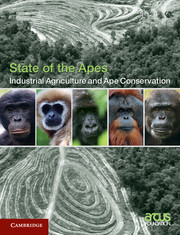Book contents
Foreword
Published online by Cambridge University Press: 01 February 2016
Summary
Last year I visited the Indonesian part of Borneo. One of the highlights was a visit to an orangutan shelter on an island covered by rainforest. There I learned that an orangutan builds a new nest every day, using leaves and branches in the trees. These great apes move around from tree to tree and hardly ever come down to the ground. When it rains, they make “umbrellas” from big leaves. Orangutans share more than 96% of their genetic makeup with humans. In fact, the name orangutan means “person of the forest.” Many orangutans have lost their habitat because of deforestation. They have become homeless and dependent upon shelters to survive.
It is widely recognized that humans are altering the natural world at an unprecedented rate. Among the greatest challenges facing us today are understanding how human social and economic systems drive these changes and implementing strategies for reconciling economic development with the protection and conservation of the very resources upon which it depends. Future generations will judge us by how we have changed our behavior to ensure that we can live within the limits imposed on us by climate, water and land. They will also evaluate our efforts to ensure social justice and respect for dignity and life, while safeguarding the beauty and diversity of nature.
The State of the Apes series aims to identify and raise awareness of potential solutions for the conservation of biodiversity—and the environment more broadly—within the parameters of ongoing economic development. The tropical forests of Asia and Africa are the natural home of great apes and gibbons. By focusing on apes as flagship species for the conservation of these valuable forests, State of the Apes seeks to stimulate dialogue and collaboration, while also informing policy and practice.
Given that tropical forest loss is a significant contributor to climate change, the conservation of these resources is critical to protecting not only the great ape and gibbon populations but also the global human population. Even if tree crops replace the natural forest that has been removed, the impact on climate change will not be countered. And the loss of species diversity will be irreversible.
This volume highlights the deleterious effects of industrial-scale agriculture on ape populations as well as other wildlife species, forests and people in South and Southeast Asia to date.
- Type
- Chapter
- Information
- Publisher: Cambridge University PressPrint publication year: 2015
- Creative Commons
- This content is Open Access and distributed under the terms of the Creative Commons Attribution licence CC-BY-NC-ND 4.0 https://creativecommons.org/cclicenses/



